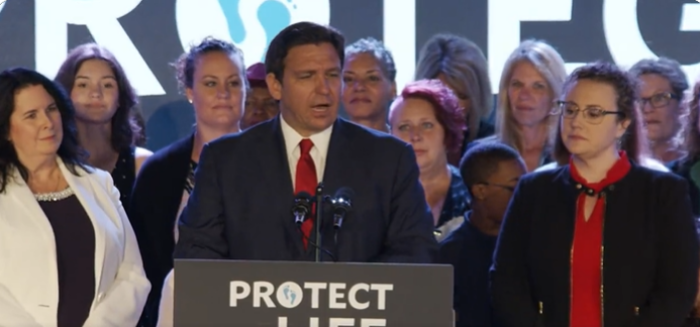Florida Gov. Ron DeSantis signs bill banning abortions after 15 weeks

Florida Gov. Ron DeSantis has signed a bill banning abortions after 15 weeks of gestation as the U.S. Supreme Court is expected to rule this year on the constitutionality of a similar law in Mississippi.
The Republican governor signed House Bill 5, also known as the Reducing Fetal and Infant Mortality Act, into law Thursday.
The measure, which goes into effect July 1, will ban abortions after 15 weeks gestation unless “two physicians certify in writing that, in reasonable medical judgment, the termination of the pregnancy is necessary to save the pregnant woman’s life” or determine that “the fetus has a fatal fetal abnormality.”
At a signing ceremony in Kissimmee, DeSantis said the bill seeks to "protect life" and "defend those who can’t defend themselves."
In a statement, DeSantis said the bill protects “babies in the womb who have beating hearts, who can move, who can taste, who can see, and who can feel pain.” He described life as a "sacred gift worthy of our protection."
Our bill protects unborn babies from abortion after 15 weeks – these are babies with beating hearts, who can move, taste, see and feel pain.
— Ron DeSantis (@GovRonDeSantis) April 14, 2022
Proud to defend life! pic.twitter.com/Xz6v4K4KGC
“I am proud to sign this great piece of legislation which represents the most significant protections for life in the state’s modern history," DeSantis said.
Kara Gross, the legislative director and senior policy counsel for the ACLU of Florida, criticized the legislation as “shameful," stating that "[n]obody should be forced to carry a pregnancy against their will." The progressive legal organization vowed to “take swift legal action to protect Floridians’ rights and defend against this cruel attack on our bodily autonomy.”
"HB 5 ignores real-world situations — it is not always possible for people to obtain an abortion within the arbitrary timeframe provided in this bill, even if they’ve been trying to get one for weeks," Gross said in a statement. "There are already so many barriers to abortion care, especially for young people, those with fewer resources, and those who live in rural areas."
President Lynda Bell of Florida Right to Life, a chapter of the pro-life lobbying group National Right to Life, was present with DeSantis at the signing ceremony. Carol Tobias, president of the National Right to Life, praised Florida Right to Life's work to get the bill passed.
“We praise Governor Ron DeSantis, the pro-life members of the Florida state legislature and Florida Right to Life for all of the hard work that went into seeing this legislation become law,” Tobias said in a statement. “No unborn child should suffer and die from an abortion. Florida’s law will protect unborn children and their mothers from the horrors of abortion.”
The Republican-controlled Florida Senate passed the bill in a 23-15 vote on March 3, and the Florida House of Representatives approved the legislation in a 78-39 vote on Feb. 17.
Other pro-life leaders cited Florida's enactment of House Bill 5 as the latest example of the momentum at the state level ahead of a highly anticipated U.S. Supreme Court ruling on Mississippi's 15-week abortion ban in the case of Dobbs v. Jackson's Women's Health.
Marjorie Dannenfelser, president of the national pro-life lobbying organization Susan B. Anthony List, believes the Florida bill "may save more than 3,300 lives a year by protecting unborn children, as well as their mothers, from cruel and dangerous late abortions.”
“Science tells us unborn children are human beings with a vibrant life in the womb, and by 15 weeks they can feel pain — yet under current Supreme Court precedents the United States allows abortion on demand right up to birth,” Dannenfelser said in a statement. “On abortion policy, we have more in common with China and North Korea than virtually the entire world.”
“As we await a decision in the Dobbs case, momentum is growing across America to modernize our extreme abortion laws," she added.
The Supreme Court’s expected ruling in the Mississippi case could have significant implications for abortion law in the U.S.
A ruling in favor of the state of Mississippi, which is seeking to uphold its 15-week abortion ban, would pave the way for other states, such as Florida, to enact similar legislation. A decision in favor of Mississippi would depart from previous rulings upholding the 1973 Supreme Court decision Roe v. Wade, which legalized abortion nationwide.
Some pro-lifers have expressed optimism about the possible outcome of the Dobbs case as the nation's high court consists of six justices appointed by Republican presidents and three justices appointed by Democratic presidents.
Other states have passed similar laws, and some have even placed even stricter restrictions on abortion. Most notably, Texas passed a law last year that bans most abortions after six weeks of gestation — or once a baby can feel pain. Neighboring Oklahoma implemented a near-total ban on abortion just this week and the Kentucky legislature overrode the governor's veto this week to pass a 15-week abortion ban into law.
In other states, pro-abortion state lawmakers have codified the right to abortion into state law amid concerns about the Supreme Court potentially weakening the precedent set by Roe v. Wade or overturning the decision entirely.
Colorado passed a law declaring that “a fertilized egg, embryo, or fetus does not have independent or derivative rights under the laws of this state.” The law emphasizes that “a pregnant individual has a fundamental right to continue a pregnancy or give birth or to have an abortion and to make decisions about how to exercise that right.”
Ryan Foley is a reporter for The Christian Post. He can be reached at: [email protected]




























